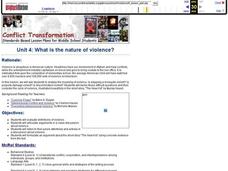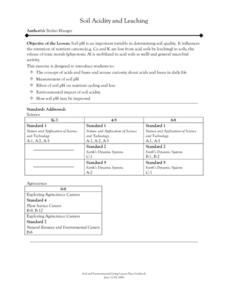Curated OER
Life Cycles of Plants
Students discover the general life cycle of a plant, the parts of a plant, and what it needs to grow. They plant bean seeds and discuss the parts of a plant and what it needs to grow.
Curated OER
Birth, Growth and... Reproduction!
Students research the Arctic Hare and chart relevant information under month headings. They compare the information about the Arctic hare to other Arctic mammals.
Curated OER
Going in Cycles: The Life of an Aluminum Can
Learners explore the life cycle of aluminum cans. In this recycling lesson, students review the manufacturing process and how to make a closed loop cycle. Learners also have the opportunity to present what they've learned to others...
Curated OER
Science: Entomology in Action
Students discover how coroners use insect life cycles to estimate the time of death in cases. they describe how forensic entomologists combine environmental factors with insect life cycles to note the changes. Students examine an...
Curated OER
Exploring the Beach
Students explore the beach. In this marine habitat lesson plan, students inspect sand grains, design beach profiles, classify marine life, and examine natural beach habitats. Students use spreadsheets to record data from their activities...
Curated OER
Strawberry Girl: Outdoors in Florida
Students explore nature by researching the state of Florida. In this animal identification instructional activity, students read a children' story and research the Internet to discover the difference in animal life between the early...
Curated OER
What's In The Forest?
Students examine forest food chains and create a forest habitat in the classroom. They are introduced to the concept of interdependence in Nature. They define a simple forest food chain and develop inquiry process skills.
Curated OER
Web of Life Game: Trout
Students explore the concept of food webs. In this food web lesson, students demonstarte the connection between species. Students use a ball of string show how the food web works, then have a class discussion.
Curated OER
The Greatest Show on Earth: The World's Smallest Animals
Students create instruments to capture different types of insects. In this The Greatest Show on Earth: The World's Smallest Animals lesson, students compare the attributes of certain insects and record the data on a chart. After catching...
Curated OER
Fred the Fish -- A River Ran Wild
Students apply cause and effect relationships to water pollution in a stream. In this pollution lesson students recognize the importance of clean water in their daily lives. Students accompany "Fred the Fish" as he travels down stream....
Curated OER
Way Down in the Deep Blue Sea
Uncover the mysterious wonders of the ocean with activities that span the subjects!
Science Matters
That’s An Otter Story
Young scientists discover how sea otters' habitats have changed due to human impact. Through conversation, video observation, and story reading, scholars identify how human interactions change a specific ecosystem in both positive and...
Curated OER
Flight of the Painted Ladies
Students explore the life cycle of the Painted Lady Butterfly. They set up cameras near a butterfly culture. They create an iPhoto photo book to document and journal their observations of the metamorphosis. Students produce a narrated...
Curated OER
How Do We Know These Beetles Are Safe to Use?
Pupils evaluate the impact beetles have on plants. In groups, they select plants to expose to leaf-feeding beetles and place those beetles on the caged plants. They observe the beetles and discuss the insect and plant interaction during...
Curated OER
Nutrition and Energy Flow
In this energy flow worksheet, students will complete 10 short answer questions based on a food web diagram. Then students will review different cycles in nature including the water cycle, carbon cycle, and energy cycle. This worksheet...
Curated OER
What is the Nature of Violence?
Students consider the implications of violence in American culture. In this sociology lesson, students analyze the meaning of violence as they define violence and participate in a classroom debate.
Teach-nology
Mike, Mike Motorbike
If your kids like motorcycles and dirt bikes, they'll enjoy reading about Mike and his daredevil tricks. After reviewing eight words in a word bank, they fill in the blanks throughout the short passage using context clues.
Curated OER
From Caterpiller to Butterfly: Cycles, Circles, and Patterns
Students examine art of butterflies and discuss what they know about the insect. They create their own butterfly puppets and write a story to represent its life cycle.
Curated OER
City Wildlife in a Vase
Students examine a still-life painting. They discuss the observation of nature by scientists and artists and explore the symbolism of biological life cycles depicted in a painting.
Curated OER
Water: Our Most Important Beverage
Third graders create a KWL chart about water. In this environmental science lesson, 3rd graders demonstrate how much water on Earth is usable. They act out the different stages of the water cycle.
Curated OER
Soil Acidity and Leaching
Young scholars are introduced to the concept of acids and bases and arouse curiosity about acids and bases in daily life. They are introduced to the measurement of soil pH. Pupils are introduced to the effect of soil pH on nutrient...
Curated OER
The Cool Forms of Water
Students discover the different forms of water on Earth. For this states of water lesson, students read material on the different forms of water and how they are created. The students answer written questions on worksheets.
Curated OER
Elements for Disaster Reporting
Students identify the elements of natural disasters and gain an understanding on how the media influences people's responses to disasters. In this natural disaster lesson plan, students study the impact of natural disasters, and the...
Curated OER
Compost in a Bag!
Fourth graders experiment to see which objects decompose. In this compost lesson, 4th graders observe the changes of labeled objects in a bag. Leave the objects for one month and record the changes by observation and weight. Students...

























